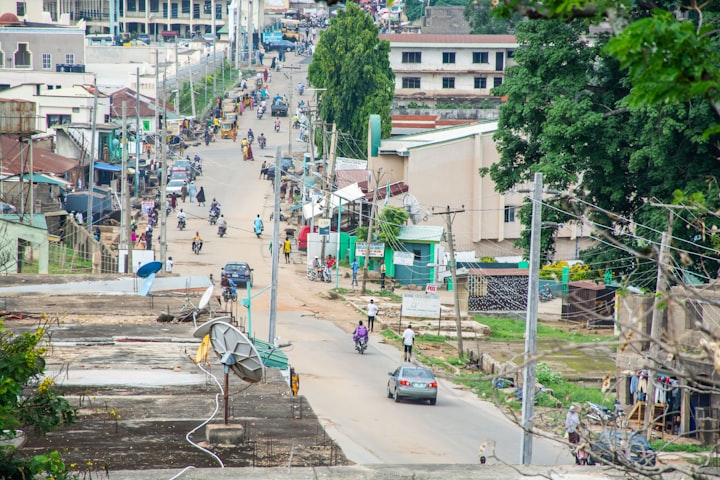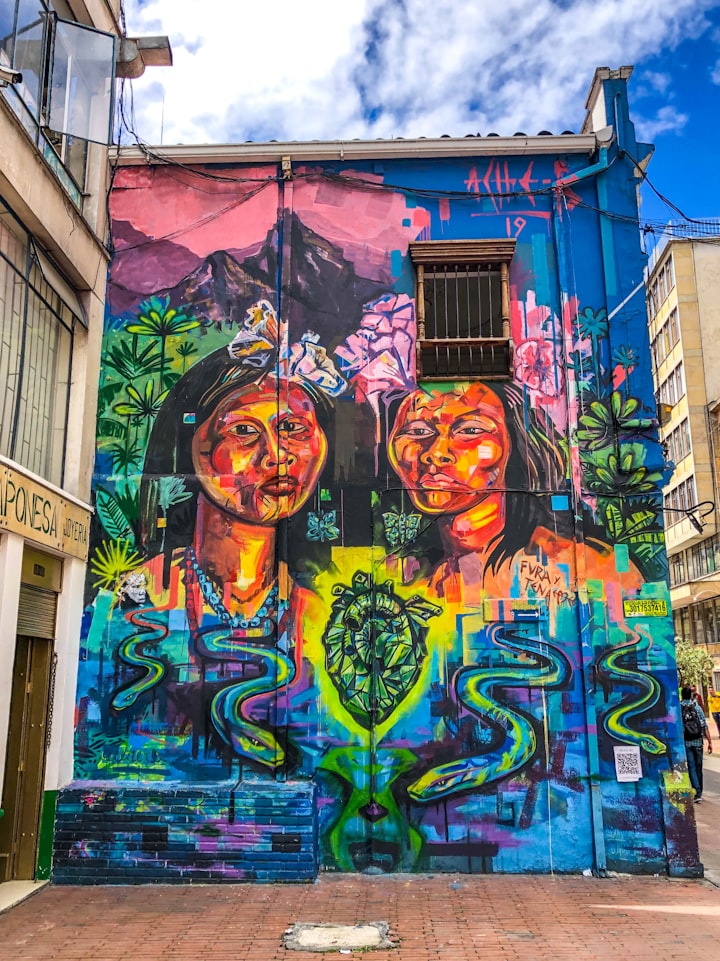The Triumph of Democracy's Flame
Reflecting on the emotions evoked by the preservation of democracy and individual freedoms

Once upon a time, in the heartland of Nigeria, there existed a small village called Hopeville. The people of Hopeville had yearned for freedom and longed for the warm embrace of democracy for as long as they could remember. They were tired of oppression, corruption, and a lack of voice in their own destiny.
In the village square, a humble tailor named Ayo stood atop an old wooden crate, his voice echoing through the crowd. He spoke passionately, his words resonating with the collective yearning of the people.
"Brothers and sisters, our voices have been silenced for far too long," Ayo proclaimed, his eyes gleaming with determination. "In the upcoming presidential election, we have the power to ignite the flame of democracy that will illuminate our path to a brighter future!"
A spark of hope ignited within the hearts of the villagers as they listened intently to Ayo's words. They could feel the weight of history on their shoulders and the significance of their vote. The air was charged with emotion, and the spirit of democracy permeated through their souls.
As election day approached, the village transformed into a vibrant sea of colors. Women adorned in traditional attire carried the torch of democracy, their faces etched with determination. Men stood tall, their chests puffed out with a renewed sense of pride. The youth, filled with energy and optimism, rallied behind the ideals of a better tomorrow.
Amidst the hustle and bustle, a young girl named Ada clutched her grandmother's hand tightly. Her eyes shimmered with hope as she witnessed the power of unity and the beauty of democracy unfolding before her.
On the day of the election, the village lined up patiently, each person eager to cast their vote, a symbol of their freedom. The ballot box stood tall, like a sentinel guarding the village's dreams. The villagers stepped forward, their hearts pounding with emotion, as they marked their choices on the ballot paper.
Days turned into nights, and the village held its breath in anticipation. The counting of votes commenced, accompanied by a hushed silence that filled the air. The fate of Hopeville hung in the balance.
Finally, the results were announced. Ayo, the tailor who had ignited the flame of hope, emerged as the victor. The village erupted in jubilation, tears of joy streaming down the faces of the villagers. Democracy had triumphed. Freedom had found its voice.
Ayo stood before the people, his voice trembling with emotion. "Today, we have proven that our dreams are not in vain," he declared. "Together, we shall build a future where every voice is heard, every life is valued, and every dream can be realized."
The story of Hopeville spread far and wide, inspiring neighboring villages and capturing the hearts of a nation. The emotional journey of this small village ignited a fire within the hearts of Nigerians, reminding them of the power they held in their hands. Democracy's flame burned brighter than ever, fueled by the unwavering spirit of the people.
And so, the tale of Hopeville became a symbol of the transformative power of democracy and the unbreakable spirit of a nation that refused to be silenced. In the years that followed, the legacy of Ayo and the people of Hopeville shaped the destiny of Nigeria, lighting the way for a future where democracy and freedom would forever intertwine.
The triumph of democracy's flame in Hopeville became a reminder to the world that when the collective will of a people is ignited, the possibilities for change and progress are limitless.
As the news of Hopeville's democratic triumph spread throughout Nigeria, the story captured the attention of a young journalist named Amara. She was captivated by the emotional journey of the village and felt a deep sense of responsibility to share their story with the world.
Amara embarked on a journey to Hopeville, determined to document the experiences and aspirations of its people. She arrived in the village and was welcomed with open arms by Ayo and the villagers, who were eager to share their stories with her.
Amara listened intently as the villagers spoke of their struggles, their dreams, and the profound impact that the election had on their lives. She witnessed the transformative power of democracy firsthand, as ordinary people stepped into positions of leadership and began implementing positive changes in their community.
Through her interviews, Amara discovered that the election had not only awakened a sense of democracy in Hopeville but had also served as a catalyst for unity and reconciliation. The village had overcome deep-seated divisions and embraced the power of inclusivity and diversity.
Amara's articles and interviews gained widespread attention, touching the hearts of Nigerians across the country. The story of Hopeville became a symbol of hope, inspiring citizens from various backgrounds to come together and strive for a brighter future.
The success of Hopeville's democratic revolution reverberated beyond Nigeria's borders. The international community took notice, recognizing the resilience and determination of the people. Hopeville became a beacon of hope for other nations striving to break free from oppression and embrace the principles of democracy and freedom.
Moved by the emotions she witnessed and the stories she had collected, Amara published a book titled "Flames of Democracy: The Story of Hopeville." The book not only chronicled the village's journey but also served as a rallying cry for those yearning for change.
Amara's book became a bestseller, spreading the message of democracy and freedom to millions around the world. She was invited to speak at international conferences, sharing the story of Hopeville and inspiring others to stand up for their rights and fight for the principles that mattered most to them.
In the years that followed, Hopeville continued to thrive under Ayo's leadership. The village became a model of good governance, with transparent decision-making processes, equitable distribution of resources, and a commitment to community development.
The emotional tale of Hopeville's triumph served as a reminder that democracy and freedom were not abstract concepts but rather living, breathing forces that could shape the destiny of nations. The people of Nigeria and beyond were forever touched by the courage and determination of Hopeville's villagers, igniting a spark within them to demand their rights and strive for a better tomorrow.
Hopeville's story became a testament to the power of one village, one election, and one unwavering belief in the transformative potential of democracy. The flame of democracy burned brightly, illuminating the path to progress for generations to come.
In the years that followed Hopeville's democratic triumph, the impact of their story continued to reverberate throughout Nigeria. The success and transformation of the village inspired a wave of civic engagement and political consciousness across the nation.
Emboldened by the example set by Hopeville, citizens from different regions of Nigeria began organizing grassroots movements, advocating for transparency, accountability, and good governance. The emotional journey of the village had demonstrated that change was possible, and the collective voice of the people could shape the future of their nation.
The youth, in particular, felt a renewed sense of purpose and empowerment. They formed vibrant networks, using social media platforms to mobilize and amplify their voices. Hopeville had proven that age was not a barrier to making a difference, and the youth were determined to create a Nigeria where their dreams could flourish.
Political candidates in subsequent elections realized the power of the people and the emotions that drove them. They were compelled to connect with the hopes and aspirations of the electorate in ways they had never done before. Campaigns focused on empathy, addressing the emotional needs of the people, and promising to tackle the pressing issues that had burdened the nation for far too long.
The emotional narrative of Hopeville also sparked a renewed interest in civic education. Schools incorporated lessons on democracy, citizenship, and the importance of active participation in governance. A new generation of Nigerians grew up with a deep understanding of their rights and responsibilities, ready to contribute to the nation's progress.
Hopeville became a symbol of national unity, transcending ethnic and religious divides. Inspired by the village's transformation, communities across Nigeria began to bridge their differences and embrace a collective identity as Nigerians. The emotional bonds forged in the wake of Hopeville's success became the foundation for a more inclusive and harmonious society.
As the flames of democracy continued to spread, the government responded by instituting reforms to strengthen democratic institutions and protect the rights of the people. Transparency measures were implemented to curb corruption, ensuring that the nation's resources were utilized for the betterment of all Nigerians. The emotional scars of past injustices slowly healed as the country took bold steps towards reconciliation and justice.
International observers lauded Nigeria's progress, highlighting the remarkable journey from Hopeville's humble beginnings to a nation on the path to true democracy. Hopeville became a pilgrimage site for activists, researchers, and diplomats from around the world who sought to learn from its success story.
In recognition of the village's contributions to Nigeria's democratic development, Ayo and other key figures from Hopeville were invited to speak at prestigious global forums. Their emotional accounts touched hearts worldwide, igniting a global movement for democracy and inspiring nations grappling with their own challenges.
The lessons of Hopeville resonated far beyond Nigeria's borders. In countries facing political turmoil and oppression, the tale of the village became a symbol of resilience and the power of the people to shape their own destinies. Activists and citizens looked to Hopeville for guidance, drawing strength from its emotional narrative and using it as a blueprint for their own struggles.
Back in Hopeville, Ayo stood on the same wooden crate where he had first rallied the village together. Tears of pride filled his eyes as he gazed upon the thriving community before him. Hopeville had come a long way, but its journey was far from over. The emotional spirit that had guided them thus far would continue to propel them forward, driving them to fulfill their dreams and aspirations.
The story of Hopeville served as a timeless reminder that democracy was not a destination but an ongoing journey. It was a journey fueled by emotions, aspirations, and the collective will of a people yearning for a better future. With Hopeville as their guiding light, Nigeria continued to evolve, nurturing the flames of democracy and freedom that burned deep within the hearts of its citizens
About the Creator
Oluwole Olajide
I'm a writer, blogger, and creative strategist. I help businesses and individuals tell their stories in a way that is both engaging and informative. I believe that everyone has a story to tell, and I'm passionate to help people share theirs






Comments
There are no comments for this story
Be the first to respond and start the conversation.